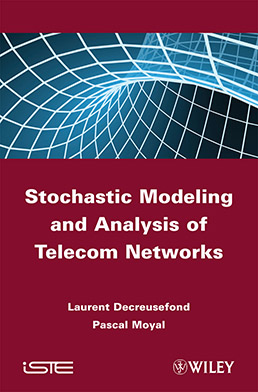
This book addresses the stochastic modeling of telecommunication networks, introducing the main mathematical tools for that purpose, such as Markov processes, real and spatial point processes and stochastic recursions, and presenting a wide list of results on stability, performances and comparison of systems.
The authors propose a comprehensive mathematical construction of the foundations of stochastic network theory: Markov chains, continuous time Markov chains are extensively studied using an original martingale-based approach. A complete presentation of stochastic recursions from an ergodic theoretical perspective is also provided, as well as spatial point processes.
Using these basic tools, stability criteria, performance measures and comparison principles are obtained for a wide class of models, from the canonical M/M/1 and G/G/1 queues to more sophisticated systems, including the current “hot topics” of spatial radio networking, OFDMA and real-time networks.
1. Introduction.
Part 1. Discrete-time Modeling
2. Stochastic Recursive Sequences.
3. Markov Chains.
4. Stationary Queues.
5. The M/GI/1 Queue.
Part 2. Continuous-time Modeling
6. Poisson Process.
7. Markov Process.
8. Systems with Delay.
9. Loss Systems.
Part 3. Spatial Modeling
10. Spatial Point Processes.
Laurent Decreusefond is Full Professor at Télécom ParisTech (one of the most prestigious engineering schools in France), where he is part of the Computer Sciences and Networking department. He has published many research papers in high-level international journals, on queuing theory, stochastic analysis, random graphs and stochastic geometry.
Pascal Moyal is currently Associate Professor in the Applied Mathematics department of Compiègne University of Technology in France, after previously holding a one year invited researcher and lecturer position at the New Jersey Institute of Technology in the USA. He has published many research papers in high-level international journals, on queuing theory, ergodic theory and random graphs.